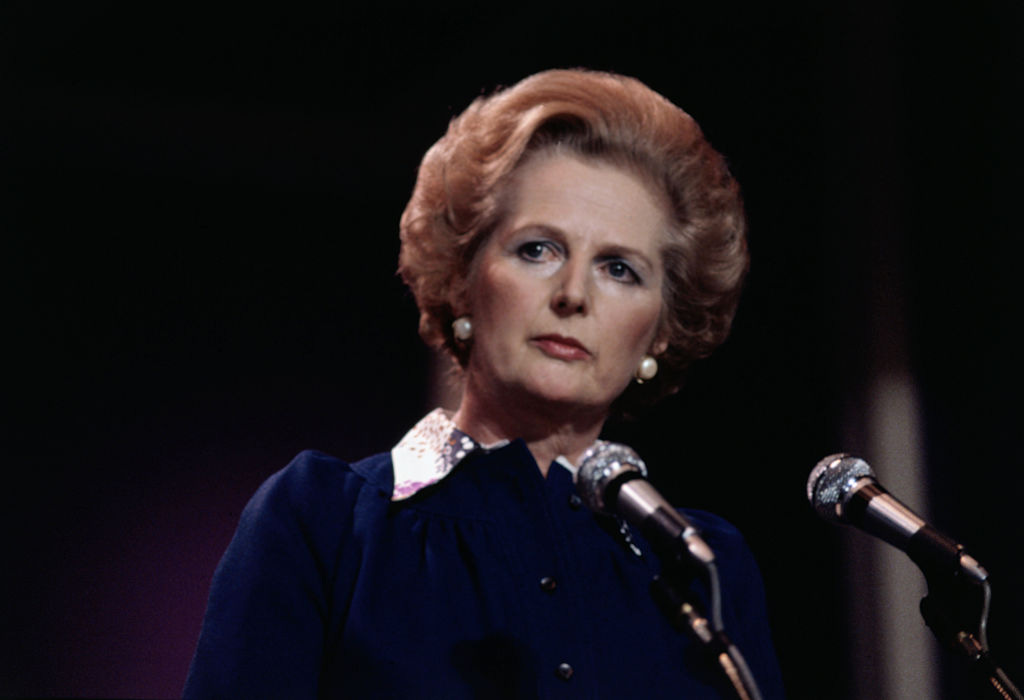What Should a Leader Sound Like?
Note: the video clips of leaders’ voices are embedded in the written article but are not included in the audio version of the essay
During the 1979 general election campaign, Gordon Reece, an adviser to Margaret Thatcher, head of Britain's Conservative Party, worried that Thatcher's voice was too shrill. Reece, a former journalist and television producer, knew that how politicians sound can be as important as how they look.
Thatcher took lessons with the speech coach of the National Theatre designed to lower her voice so she would project a sense of calm authority. After she was elected as Britain's first female Prime Minister, that deeper voice became an important part of her profile as the "Iron Lady."

Every age has its own ideas of what a leader should sound like. The vocalizing of figures popular between the world wars, such as Benito Mussolini, might seem overwrought to us today. Gender, racial, and regional biases, too, factor into discernments of who sounds “right” to us as a political leader.
Often, as Reece found, it's been individuals with a lower voice, whether men or women. A 2015 study found that the lower the pitch, the more favorably leaders are regarded in terms of qualities such as strength, dominance, and career prospects—including electability.
Even having your vocal abilities impaired by illness is no liability for politicians, as long as that illness leaves your voice lower and more gravelly than before. That was the conclusion of a 2017 study conducted in France about the "likeability" and charisma of Italian politician Umberto Bossi after a stroke that affected his vocal cords, and of former Brazilian president Luiz Inacio Lula da Silva after throat cancer (Lula is now running for president against incumbent Jair Bolsonaro).
Likewise, Bernie Sanders' distinctive rumble of a voice -- righteously cranky, hoarse from wear, with a strong Brooklyn accent -- was among his biggest assets in the U.S. 2016 presidential campaign, broadcasting authenticity to his followers.
The continuity of this preference for lower voices in leaders is, among other things, a sign that traditionally male-identified qualities have been normalized as benchmarks of credibility in politics, whether the politician is male or female.
The "Dean Scream" episode involving the 2004 presidential campaign of Howard Dean, a three-term governor of Vermont, is revealing in this regard. At the end of a campaign event, Dean's normally unremarkable voice cracked, turning his utterance of "Yeah!" into something resembling a scream -- a female-identified vocal act. The ridicule he received when the media replayed the sound endlessly caused his campaign to lose momentum.
Hillary Clinton was in theory a strong presidential candidate by this measure. Throughout her career, she has exhibited vocal stability. Her flat and hard-edged voice, which exhibits minimal pitch variations, mirrors her no-nonsense and fairly unemotional leadership style. It certainly served her well during the 11-hour Benghazi hearings she was subjected to in 2015.
Her opponent, Donald Trump, nonetheless played the gender card effectively, depicting Clinton as vocally aggressive. Interviewed in April 2016, Trump said he was “not quite recovered” from hearing Clinton “shout” during a primary victory speech she had given the night before. Highlighting the horror of the raised female voice, he evoked the specter of the harpy out to victimize men. What do you do with such a shouty woman? You lock her up.
As for Trump, his vocal profile is key to his appeal. Dominant male voices are marked by depth and reverberation. Trump displays both, but his vocal style is also edgy, with variations of pitch and tone.
Trump turns verbal interactions with others into demonstrations of his alpha maleness. He never adapts his pitch levels and vocal patterns to those of his interlocutors -- a practice communications theorists call “convergence.” Trump’s instinct is instead to “diverge,” setting himself apart as the leader of the pack.
Only on one occasion was Trump's voice and body language notably subdued: during his 2018 meeting with Vladimir Putin in Helsinki.
Voice gets far less attention than image in politics. And yet it plays a significant role in our judgments of leaders' competence and credibility. As we think about what a leader should sound like, we can also consider how outdated ideas of gender influence vocal norms. To reinvent politics for a new age, we must listen as carefully as we look.




Jeffrey Sachs on a recent Democracynow program remarked how American foreign policy, based on the idea that the US must rule the world, is "bipartisan." The US policy makers, republican and democratic, can't agree that climate is an existential threat, but they all agree we must spend more on defense to counter imagined threats from China and Russia. To deal with climate, like pandemics, requires cooperation. Both women, Nancy Pelosi and Hillary Clinton, have not deviated from supporting a militaristic US policy seeking to rule the world. We need a new woman whose alpha female voice speaks for cooperation rather than control.
Folks have no idea what they buy, due to, tone, color, presentation and most of all, hook. It’s gotta hook ya. That hook is dependent on the environment and what’s happening. There has to be a primitive resonance, a connection. Golda Meir was one of the best I’ve ever seen. Tough, when tough was needed. Style has to match history. What a ride…………. Thank you all for this year. I have learned so much from all of you. Thank you Ruth for this awesome platform of “Pedagogy”. We are all oppressed, and you, teach us, by allowing this, coming together. Ain’t like you get paid for it. Pro Bono has its place……….. In 2 days, I will be 70. Another years subscription is my gift to me. I am so grateful to all of you.